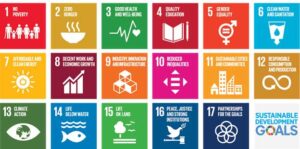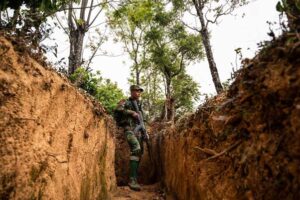
Africa, Civil Society, Crime & Justice, Economy & Trade, Energy, Featured, Financial Crisis, Headlines, Labour, TerraViva United Nations

Credit: Kabir Dhanji/AFPvia Getty Images
– Kenya’s President William Ruto has withdrawn the tax-increasing Finance Bill that sparked mass protests. He has sacked his cabinet and the head of the police has resigned. But the anger many feel hasn’t gone away, and protests continue.
The protests have brought Kenya’s Gen Z onto the political stage, with young people – over 65 per cent of the population – at the forefront. Since the protests began, they’ve made full use of social media to share views, explain the impact of proposed changes, organise protests and raise funds to help those injured or arrested.
These protests have been different to those in the past, much more organic than previous opposition-organised demonstrations. The movement has brought people together across the ethnic lines politicians have so often exploited in the past.
People have protested even in the knowledge that security force violence is guaranteed. At least 50 people have died so far. As protests have continued, people have increasingly demanded accountability for the killings and the many other acts of state violence.
Out-of-touch elite
The Finance Bill would have imposed a levy on a range of everyday essentials such as bread, and taxes on internet use, mobile phones and money transfer services. Women would have been further hit by an increase in tax on menstrual products. For many, this was simply too much to bear in a context of high youth unemployment and rising costs.
The tax increases were among conditions demanded by the International Monetary Fund (IMF) in return for a US$3.9 billion package, along with the IMF’s usual prescription of spending cuts and privatisation that generally hit the poorest people hardest.
Ruto has continued to blame his predecessor, Uhuru Kenyatta, for lavish spending on grand projects. But Ruto was Kenyatta’s vice president, and only broke with his long-time ally after he wasn’t chosen as his party’s next presidential candidate.
To protesters, Ruto is as out of touch as the presidents before him. Opponents accuse him of trying to boost his presence on the world stage, including by offering to have Kenya lead an international policing mission to violence-torn Haiti, rather than addressing domestic problems. They see him as too willing to meet the demands of US-dominated financial institutions such as the IMF rather than stand up for Kenyans.
Problems such as corruption and patronage have run through multiple governments. Politicians are accused of enjoying lavish lifestyles insulated from people’s everyday problems. Kenya’s members of parliament are proportionally the second-highest paid in the world, earning 76 times average per capita GDP. Even so, corruption allegations are rife.
Ruto’s administration attempted to create another layer of government jobs a court ruled the move unconstitutional. He created new staffed offices for the first lady, deputy first lady and prime ministerial spouse, a decision dropped due to the protests. The proposed budget was filled with such examples of the government planning to spend more on itself.
Broken promises and state violence
For many, the sense of betrayal is heightened because when Ruto won an unexpected and narrow election victory in 2022, it was on a platform of being the champion of struggling people, promising to tackle the high cost of living. But costs kept increasing, and Ruto quickly reneged on promises to stop electricity price rises. He axed subsidies on energy, fuel and maize flour. The government’s 2023 Finance Act included a raft of new taxes and levies.
These measures sparked opposition-organised protests, and the reaction was state violence that left six people dead. The pattern is consistent. Kenyan security forces seem to know no response to protest other than violence.
On 25 June, the worst day of violence in the 2024 protests, security forces fired live ammunition at protesters, killing several, including some reportedly targeted by police snipers perched atop buildings. They’ve also used rubber bullets, teargas and water cannon, including against media and medical personnel. Protest leaders and social media influencers have been targeted for abduction and arrest.
🇰🇪We call for the immediate release of peaceful #protesters violently repressed and unlawfully detained for opposing a controversial #FinanceBill. The Kenyan authorities must uphold citizens’ right to peaceful assembly guaranteed by the national constitution. #Kenyaprotests pic.twitter.com/pPW1m7P1Xc
— CIVICUS (@CIVICUSalliance) June 21, 2024
On 25 June, some protesters briefly attempted to storm parliament and started fires, but there have been accusations that politicians have paid people to infiltrate the protest movement and instigate acts of violence to try to justify security force brutality. Media providing live coverage of protests have reported receiving threats from the authorities telling them to shut down and internet access has been disrupted. Influencers have had their accounts suspended.
Although Ruto eventually pledged to take action where there is video evidence of police violence, he’s also been criticised for saying little about protest deaths and previously praised police actions. He accused ‘organised criminals’ of hijacking the protests and called the attempt to storm parliament ‘treasonous’.
Politicians have repeatedly smeared civil society organisations, claiming they’re being used by foreign powers to fund protests. Ruto, without any evidence, has accused the US-based Ford Foundation of helping finance unrest.
Demands for change
Over a month on, protests demanding Ruto’s resignation continue. It’s not just about the economy, and it’s not just about Ruto. It’s about the rejection of a whole political class and its way of governing. Trust in the institutions of government is very low.
Dialogue has been promised, but many feel it will be superficial. The government’s response to the protests should be to listen and consult deeply – and then change. People have shown they have power. They’ve shown that a system where they elect a political elite every few years to make decisions for them isn’t enough. They’ve shown they want something better.
Andrew Firmin is CIVICUS Editor-in-Chief, co-director and writer for CIVICUS Lens and co-author of the State of Civil Society Report.


 In June, thousands of women took to the streets of São Paulo and other cities to protest against a bill that would classify abortion after 22 weeks as homicide, punishable by six to 20 years in prison. Protests began when the lower house of Congress fast-tracked the bill, limiting debate. Abortion is currently legal in Brazil only in cases of rape, foetal malformation or danger to the life of a pregnant person. The proposed bill, promoted by evangelical representatives, would criminalise people who have abortions more severely than rapists. Public reaction has slowed down the bill’s progress and its future is now uncertain.
In June, thousands of women took to the streets of São Paulo and other cities to protest against a bill that would classify abortion after 22 weeks as homicide, punishable by six to 20 years in prison. Protests began when the lower house of Congress fast-tracked the bill, limiting debate. Abortion is currently legal in Brazil only in cases of rape, foetal malformation or danger to the life of a pregnant person. The proposed bill, promoted by evangelical representatives, would criminalise people who have abortions more severely than rapists. Public reaction has slowed down the bill’s progress and its future is now uncertain.







